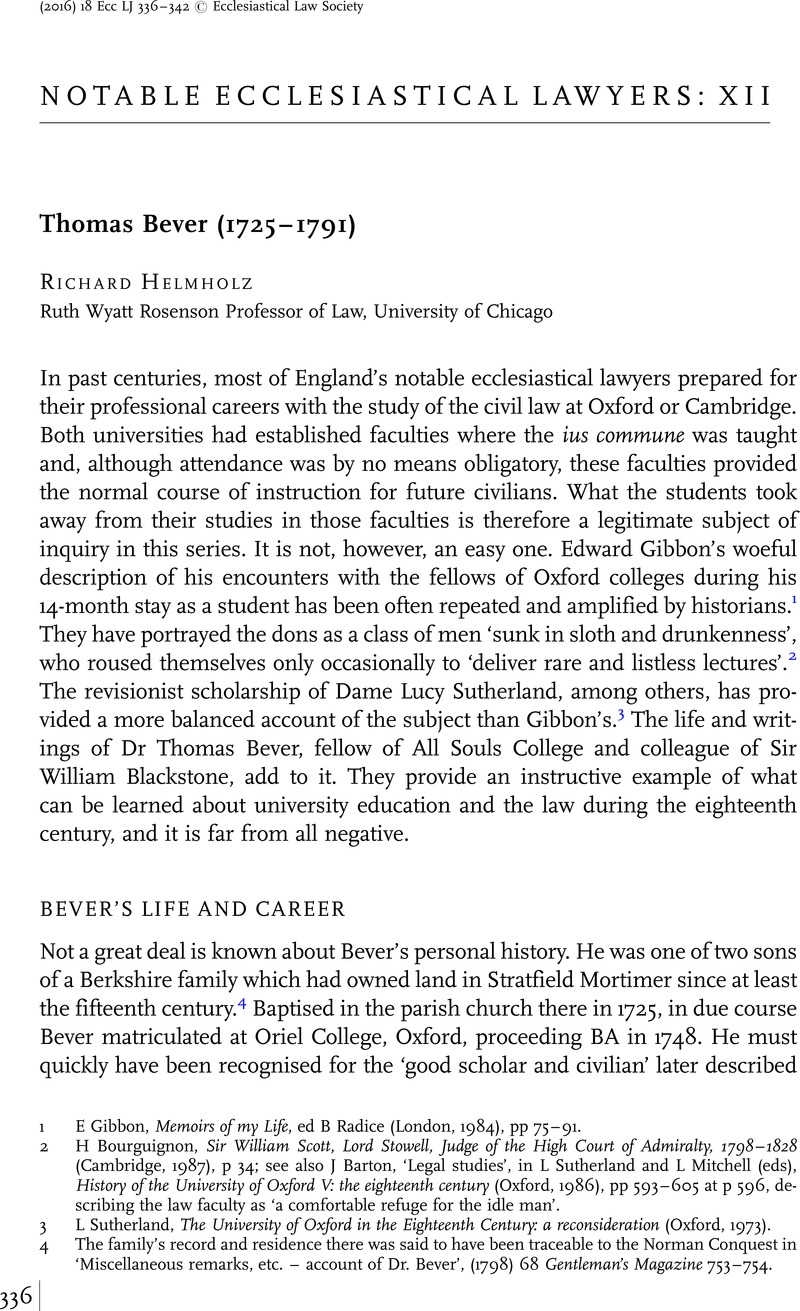Published online by Cambridge University Press: 08 August 2016

1 E Gibbon, Memoirs of my Life, ed B Radice (London, 1984), pp 75–91.
2 H Bourguignon, Sir William Scott, Lord Stowell, Judge of the High Court of Admiralty, 1798–1828 (Cambridge, 1987), p 34; see also J Barton, ‘Legal studies’, in L Sutherland and L Mitchell (eds), History of the University of Oxford V: the eighteenth century (Oxford, 1986), pp 593–605 at p 596, describing the law faculty as ‘a comfortable refuge for the idle man’.
3 L Sutherland, The University of Oxford in the Eighteenth Century: a reconsideration (Oxford, 1973).
4 The family's record and residence there was said to have been traceable to the Norman Conquest in ‘Miscellaneous remarks, etc. – account of Dr. Bever’, (1798) 68 Gentleman's Magazine 753–754 Google Scholar.
5 C Coote, Sketches of the Lives and Characters of Eminent English Civilians (London, 1804), pp 125–126.
6 J Barton, ‘Bever, Thomas’, Oxford Dictionary of National Biography (Oxford, 2004), online edn, <http://www.oxforddnb.com/view/article/2320>, accessed 24 March 2016.
7 See ‘Obituary of considerable persons; with biographical anecdotes’, (1791) 61 Gentleman's Magazine 1068Google Scholar.
8 T Bever, Discourse on the Study of Jurisprudence and the Civil Law; being an introduction to a course of lectures (Oxford, 1766), p 39.
9 W Prest, William Blackstone: law and letters in the eighteenth century (Oxford, 2008), p 115.
10 I have used the edition published in London in 1781. All subsequent references are to that edition. The work was also translated into German and published as Geschichte des römischen Staats und des römischen Rechts, trans L Voelkel (Leipzig, 1787).
11 See ‘Odofredus announces his law lectures at Bologna’, in L Thorndike, University Records and Life in the Middle Ages (New York, 1944, repr 1971), pp 66–67; see also J Brundage, The Medieval Origins of the Legal Profession: canonists, civilians, and courts (Chicago, IL, 2008), pp 249–262.
12 My understanding of this subject is more fully explained in Helmholz, R, ‘University education and English ecclesiastical lawyers 1400–1650’, (2011) 13 Ecc LJ 132–145 Google Scholar.
13 H Rashdall, The Universities of Europe in the Middle Ages, ed F Powicke and A Emden (Oxford, 1936), vol III, pp 156–157.
14 W Blackstone, Commentaries on the Laws of England, fifteenth edition (London, 1809, repr 1982), vol I, p 7.
15 Bever, Discourse, p 2.
16 Ibid, p 31.
17 Ibid.
18 Bever, History, p 149; see also A Manchester, Modern Legal History of England and Wales 1750–1950 (London, 1980), p 6.
19 See Bourgignon, Sir William Scott, p 35; W Holdsworth, History of English Law (London, 1922–1966), vol XII, p 645.
20 D Lieberman, The Province of Legislation Determined: legal theory in eighteenth-century Britain (Cambridge, 1989), p 39; M Lobban, The Common Law and English Jurisprudence 1760–1850 (Oxford, 1991), pp 19–26.
21 See Bryson, W, ‘“But I know it when I see it”: natural law and formalism’, (2016) 50 University of Richmond Law Review Online 107Google Scholar.
22 Bever, History, p i.
23 Bever, Dialogue, p 5.
24 Ibid, p 7.
25 Ibid, p 16.
26 See Bursell, R, ‘What is the place of custom in English canon law?’, (1989) 1 Eccl LJ 12–26 CrossRefGoogle Scholar.
27 Bever, History, pp 58, 69; Bever, Discourse, p 35.
28 Eg P Stein, Roman Law in European Legal History (Cambridge, 1999), pp 64–67; Wolfgang Kunkel, ‘The reception of Roman law in Germany: an interpretation’ in G Strauss (ed), Pre-Reformation Germany (New York, 1972), pp 263–281.
29 Bever, Discourse, p 24.
30 Bever, History, p 70.
31 Bever, Discourse, pp 15–16.
32 Bever, History, p 484.
33 Ibid, pp 70–71.
34 Ibid, p 484.
35 Blackstone, Commentaries, vol I, p 5.
36 Ibid, p 14.
37 Bever, History, p 70. For a parallel, see Blackstone, Commentaries, vol I, p 465 (citing Digest 25.4.1–9 as the most likely source of the common law's rule for determining paternity).
38 Bever, History, p 99.
39 Bever, Discourse, p 14.
40 See the essays in W Prest (ed), Reinterpreting Blackstone's Commentaries: a seminal text in national and international contexts (Oxford and Portland, OR, 2014); W Prest (ed), William Blackstone and His Commentaries: biography, law, history (Oxford and Portland, OR, 2009).